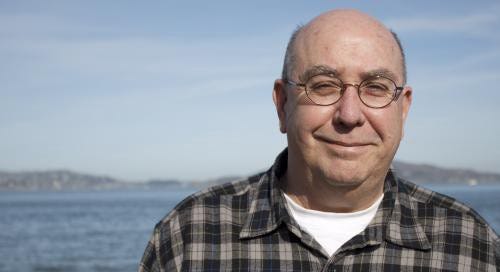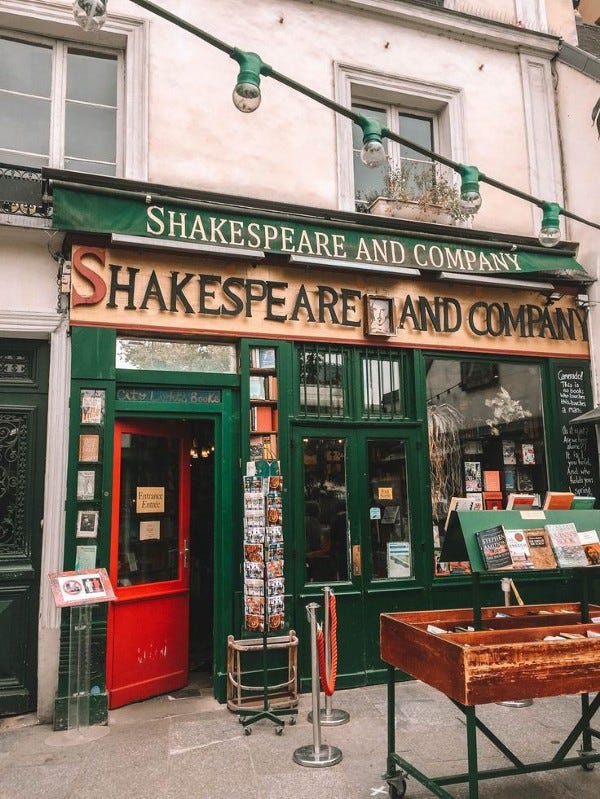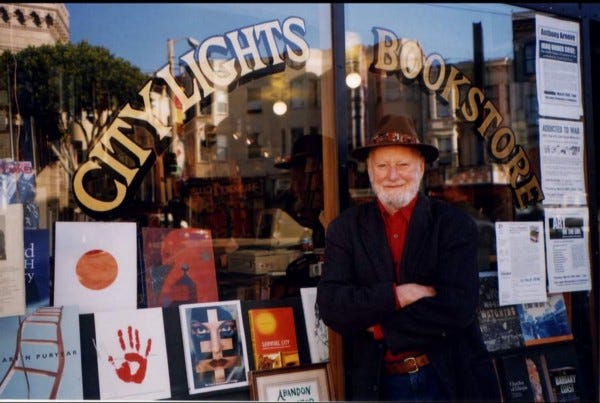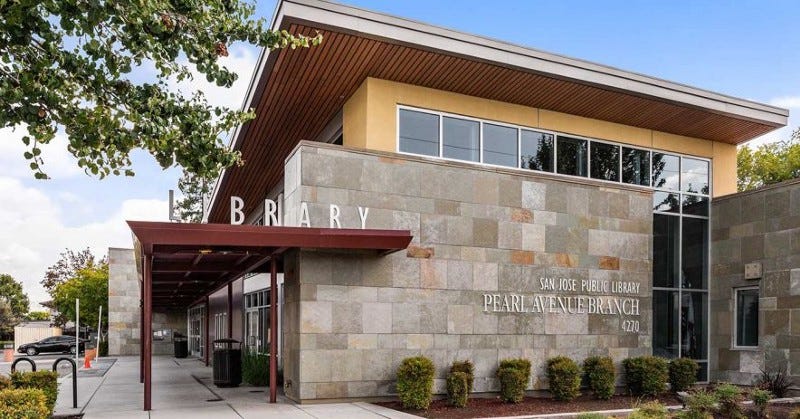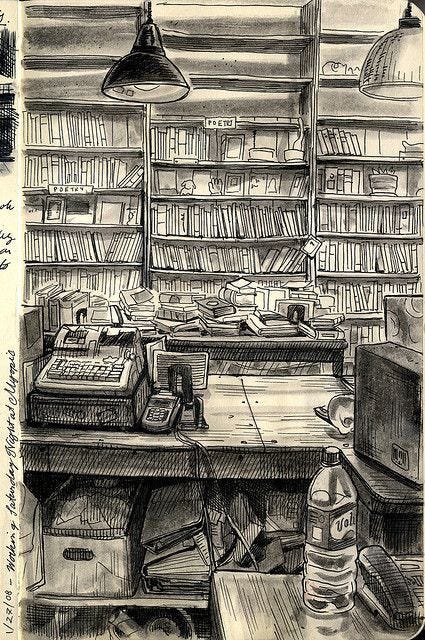‘If You’re a Writer, Literature Has Saved You At Some Point’: An Interview with Lewis Buzbee
Lewis Buzbee is a former bookseller and sales rep (for Chronicle Books), and the author of the acclaimed adult memoir, The Yellow-Lighted…
Lewis Buzbee is a former bookseller and sales rep (for Chronicle Books), and the author of the acclaimed adult memoir, The Yellow-Lighted Bookshop, published by Graywolf Press in June 2006. A native Californian, he lives in San Francisco with his wife and daughter. He is the author of the children’s books Steinbeck’s Ghost, The Haunting of Charles Dickens, and Bridge of Time. Also his books for adults include Blackboard: A Personal History of the Classroom, Fliegelman’s Desire, After the Gold Rush, and First to Leave Before the Sun.
Lewis Buzbee
Scroll down to see all my books; click on the titles to learn more about each, and to read a brief excerpt.www.lewisbuzbee.com
He is a fourth generation Californian, and the first in his family to attend college who has been writing since age 15. In college, he worked in bookstores (Upstart Crow in San Jose, then eventually managing Printers Inc. in Palo Alto). In 1986, he became a sales rep for Chronicle Books in northern California. He earned his MFA in Creative Writing (Fiction) from Warren Wilson College. Currently, he teaches Creative Writing (MFA Program) at the University of San Francisco.
“My bookstore obsession grew to the point where I’d search for new shops during family trips, as though that were the reason for our travel.” ― Lewis Buzbee, The Yellow-Lighted Bookshop: A Memoir, a History
His poems, essays, and stories have appeared in Harper’s, GQ, New York Times Books Review, Paris Review, Best American Poetry, San Francisco Chronicle, and scores of other magazines and journals.
Excerpts from the Interview :
Q1) You’ve lived a life that’s been centered around books & reading. Tell our readers about your background. When did you fall in love with books? Did you grew up in a bibliophile centric home?
Lewis : We always had books in our home, and my mother and father both read for their own pleasure, but we were not a “literary” family in any way. My mother read Gothic Romances, my father science and adventure magazines. But they read, and that’s crucial, a form of modelling adult behavior. I loved the Scholastic books I ordered in the classroom, but was not that kid under the covers with a flashlight. It wasn’t until a book report assignment my second year of high school, The Grapes of Wrath, that I became a voracious reader. I immediately read everything by Steinbeck, in six months, then moved onto other writers of that time (1972), Updike and Vonnegut and Bradbury, etc. My hunger for reading has not lessened one bit in all these decades, and is in fact today more insistent than ever. I can’t even imagine how many books I’ve read, nor how many I still long to read.
Q2) What was your first encounter with poetry and writing? What fascinated you the most about it?
The Grapes of Wrath
They shared when they had nothing, shared the last thing they possibly could, but they gave. That last piece summed up…www.goodreads.com
Lewis : Back to Steinbeck. On the night I read the first two chapters of The Grapes of Wrath, I went straight to my desk and wrote my first short story, and vowed that I would be a writer, as only someone that age can do. Then I wrote another, and another, and haven’t stopped since. I feel very fortunate to have been struck by that particular bolt of lightning. Every morning since that day, I wake up knowing I have something exciting to do.
Q3) What is the most difficult part of your writing process? What has helped or hindered you most when writing a book?

Lewis : Oddly, the most difficult part for me is when I’ve finished a draft, any draft, third or fifth, or the final one before publication. There’s a certain hollow feeling I get — I suspect it’s because I feel banished from the world I’ve created, at least for a moment, and I miss it. It can take weeks to feel bright and sharp and ready to go again.
What helps me most when writing a book is obstinance. Books are slow things: read slowly, written slowly, published even more slowly. It’s an American notion, isn’t it, that we can just will things to happen more quickly. With writing, that’s not the case, well, not for me. I can write for three hours at time, sometimes four maybe, but after a certain point, I need to step away and let my brain fill up again while I’m busy with real life.
Q4) What, to you, are the most important elements of good writing? Do you practice any writing rituals?
Lewis : For me, I always try to keep in mind that my writing is about making a connection with the reader. Sure, there is some element of self-expression in writing, but the goal, for me, is to make the reader my ally, my co-conspirator, and for the two of us to build this world together. When I start being clever, or “subtle”, or fancy, when I know I’m showing off, then I have to step back and try to find that reader again. I write because I read, because I cherish the deep intimacy of that act.
I am very habitual in my writing, same desk, same time usually, but the only ritual that works for me, really, is reading a little bit before I begin for the day. Nothing in particular, as long as it’s good prose. It’s a way of re-organizing, I think, the syntax in my brain.
Q5) You were a bookseller for years, and the best bookshops continue to enchant us and give us hope. According to you, why do Independent Bookstores matter?
Lewis : Indie bookstores are crucial because each one is so very very different. There is no template, no corporate oversight. Indies are a bunch of well-read book lovers, working in these tiny alcoves, all working for very little pay, who are passionate about getting the right books into the right hands. Indies respect that readers come in all shapes and sizes and desires, and they make it their job to feed those hungry minds. Algorithms got nothing on human booksellers. This is the joy of being a bookseller.
Q6) Did working in a bookshop make you optimistic about the future of bookselling? What did it teach you about books, people, and the reading habits we have?
Lewis : I’m always optimistic about bookselling, even during the darkest days, the 2000s, for instance, when Amazon crushed, rather heartlessly and with intention, the bookselling community in the U.S. This also coincided with the rise of the e-book (which rise flattened and now doesn’t pose any sort of threat to Indies). Just before these sea-changes, the American Booksellers Association had 5,000 member stores, but that membership dropped to 1,500 or so. The good news is that in recent years that number has risen to 2,500. I think staying power has much to do with the bookstore itself. It is the rare retail environment where you can go and browse and stay for hours and no one calls the cops. It’s a place to be, as Elias Canetti said of cafes, alone among others.
What heartens me most about the future of books and bookstores is that we know that younger readers, from today’s kids up through Gen Z and Millennials, prefer reading hard copy books. When I go to my local shop, Green Apple Books on the Park here in San Francisco, it’s filled with young people. I love that.
What I most learned about reading habits is that people read what they love, and there’s no way of predicting or shaping that. When I was first a bookseller, at eighteen, I was of course wildly idealistic, and wanted only to put Literature with a capital L in people’s hands. I came to love that there are so many readers and so many different kinds of books. I love that.
Q7) Reading your gentle memoir/history is itself a bit like browsing in a friendly bookshop. It is a book that speaks to all booklovers. So many times while reading this book, I couldn’t help but agree with your observations about books, independent bookstores, the chain bookstores, the impact of the Internet on the market for books, and the state of retail bookselling and publishing today. I strongly feel all booklovers to read this book. They will know that they are part of a unique community the world over of people who love and cherish books for the enrichment they bring to their everyday lives.
How did you decide to write this book: The Yellow Lighted Bookshop? Bits by bits, you had effortlessly captured a lifelong love affair with books, bookstores, and book-sellers that is at once heartfelt and bittersweet. What was the writing process from the beginning to the end? What inspired you?
Lewis Buzbee
I have always and ever been a lover of books and bookstores, and for over 20 years worked as a bookseller. This book is…www.lewisbuzbee.com
Lewis : I had always known that I would write a book about bookstores, and even carried around the title The Yellow-Lighted Bookshop for a long time. There have always been books about the Used and Antiquarian trade — a wonderful vein of literature! — but nothing really about new bookstores, and I’m decidedly a new books kind of guy. I wanted to share that with people, find out who else felt the same way. I wanted to talk about bookstores from the inside, the experience of it. I also thought book lovers would like to know more about the biz. One day I sat down, wrote the first pages, then it all unspooled — over the next few years, mind you.
Q8) What does literary success look like to you?
Lewis : Continuing to write. As simple as that. I’ve been very fortunate in my writing career, lots of published books, and articles and essays and poems, and have had some small commercial successes, won some very cool awards (cool to me, at least). But I’ve also not published a lot, and the big fame and money, etc., all that’s eluded me. However, that’s not why I write. Those things are so nice, but it is, in the end, about the writing, about the words on the page, about seeing the world in a new way, and about engaging with the reader. I’m still writing after fifty years, and continue to do so, and that’s success enough for me. Though let me add, I am ready at any time for the big money.
Q9) Is the profession of teaching MFA Students compatible with writing? How do you balance writing with teaching?
Lewis Buzbee
Author of novels Bridge of Time (2012), The Haunting of Charles Dickens (2010), winner of the Northern California Book…www.usfca.edu
Lewis : I accidentally stepped into teaching, after a twenty-year career in the book biz, and had never intended to teach. I like the biz. Just after I left publishing, however, I was offered a chance to teach a class when another teacher had to back out at the last minute. I found I loved it, and slowly and uncertainly it became my career.
I do teach in an MFA program, for 21 years now, but have been fortunate to find a place where I teach half-time, with benefits, and write the other half. I also don’t have to go to ghastly university meetings or sit on panels or those extra-literary things. I teach, period. Don’t call me professor (hate that word), call me Teach. It’s a wonderful balance, and consider myself quite fortunate. Because I do love the classroom and have found since I started teaching that by having to describe writing and literature to my students, that I am teaching myself along the way. It has been a great boon to my writing life. A wonderful balance.
Q10) What writing projects are you working on currently?
Lewis : I’m writing what is possibly the first novel I should have written. A novel about my father, who died when I was twelve. But it is, I hope, a novel more about memory than about a narrative. I’m telling it in shards. I’m trying to capture all the memories I had of my father when I was twelve, never going beyond that. And with the pandemic, have been writing it very patiently, a little over a year now, with maybe six months to go. I enjoy this patience.
Q11) Ernest Hemingway famously said that writers should “write hard and clear about what hurts”. Although Hemingway may not have known it at the time, research has now shown that writing about “what hurts” can help improve our mental health. Taking care of your mental health is an underestimated essential for a fulfilling and rewarding writing career. After all, it’s difficult to write well when you don’t feel your best.
5 Writers Who Suffered from Mental Illnesses & the Impact It Had on Their Art - The Airship
Some of the first research connecting creativity with mental illness was conducted in 1987, when Dr. Nancy Andreasen of…airshipdaily.com
Do you agree? Can you share your perspective on this citing any personal stories or experience?
Lewis : An MFA instructor of mine, David Huddle, told me when I was graduating that writing made him a better person. I scoffed, having known quite a few writers by that time. He clarified for me. When you are writing, he explained, you are more centered, more engaged, less likely to be spinning in your own head. This has proved true for me. In many ways, I consider my commitment to writing a public service: I’m a much better human to be around when I’m writing. Ask my wife and daughter. And this rom Flaubert: “One must live a regular and orderly life so that one’s art may be violent and original.”
But one thing I learned from Steinbeck, from his letters and his journals (especially Journal of a Novel, which he kept while writing East of Eden) is that writers best keep writing no matter how they feel. You just have to write; there is NEVER a perfect time. Steinbeck argues with himself in the mornings, he doesn’t feel good, he needs some time, he’s worried about…Then he sits down to write. How I personally feel that day doesn’t, I’ve found, affect what I’ve written, and I always feel better once I’ve written. Proust says, “Perhaps some of the greatest masterpieces were written while yawning.” If you wait for the perfect day, you’ll never write.
Q12) What memories do you have, from your childhood, about your experiences in public libraries? Did they play a role at all in your love of books and reading?
Lewis : My memories of the Cambrian branch library in San Jose , California, are vivid and urgent. Again, I was an occasional reader as a child, but that took nothing away from the magic of libraries. All those books, for free, they’re mine! And I came to love knowing that these books, the volumes I was holding in my hands, had been read by so many others — there is a deep connection in that.
Q13) Lastly, what’s the best advice you can give an aspiring writer?
Lewis : Read. Write. Revise. Repeat. That’s really all there is too it. One inspires the other inspires the other. You don’t need a social media “platform,” don’t need to go to readings or cocktail parties or network. All that may be fun but it’s extra-literary. What matters is the page. Stick to the page. And learn to tell your friends that, no thanks, not today, not this weekend, I’m busy writing.
Thank you all for reading and a big thanks to Lewis Buzbee for collaborating in today’s post!
It’s a pleasure!
If any of my readers here , wish to know more about Lewis and his work. They can open the links mentioned below. It has all the essential details.
Website : https://www.lewisbuzbee.com/
Instagram : https://www.instagram.com/buzbeebooks/
Twitter : https://twitter.com/buzbeebooks
